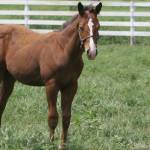OCD Study Looks for Metabolic Clues

Osteochondritis dissecans (OCD) is a developmental orthopedic disease that results in lameness in young horses. Various dietary factors (mineral balance in pregnant mares and rate of growth in foals and weanlings) have been implicated in the development of the problem, but these findings are not the only influences.
In an attempt to discover information about the genetic base for this disease, scientists used complex multivariate statistical analyses of serum, saliva, and urine from affected Standardbred yearlings and their unaffected half or full siblings. There were no differences in total plasma glucose or insulin, but metabolites that differed between the two groups included alpha and beta glucose, phenylalanine, choline, threonine, valine, and some lipids.
These metabolic differences may aid in genomic identification of the defective metabolic pathways in genetically predisposed foals. If at-risk foals can be identified early in their lives, management strategies can be designed to minimize OCD development.








